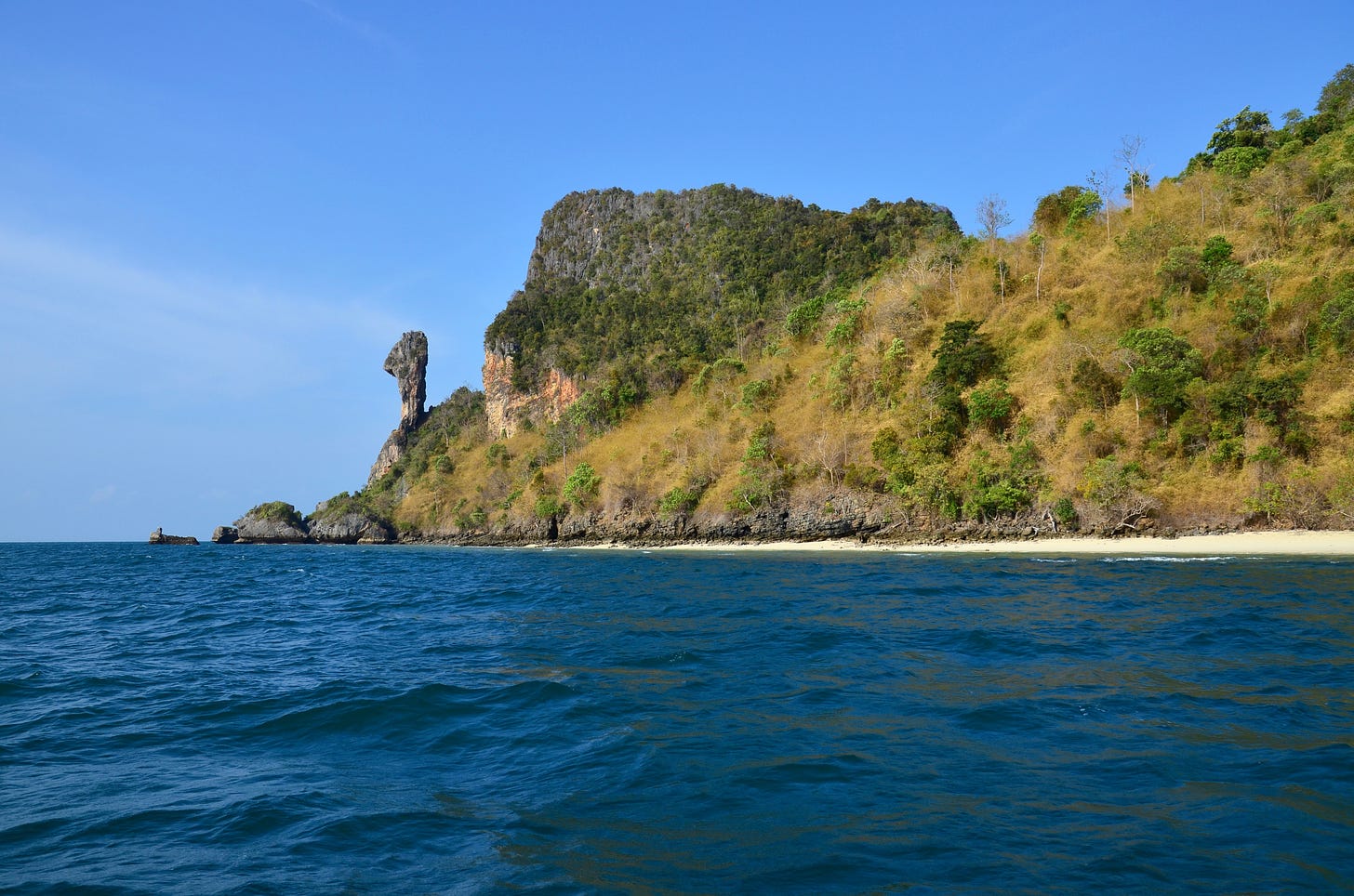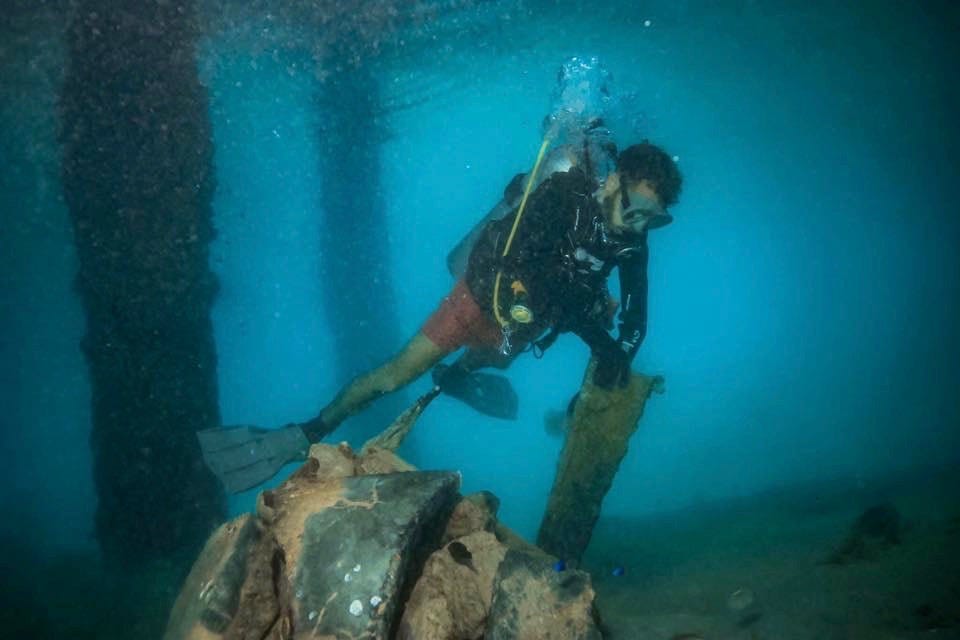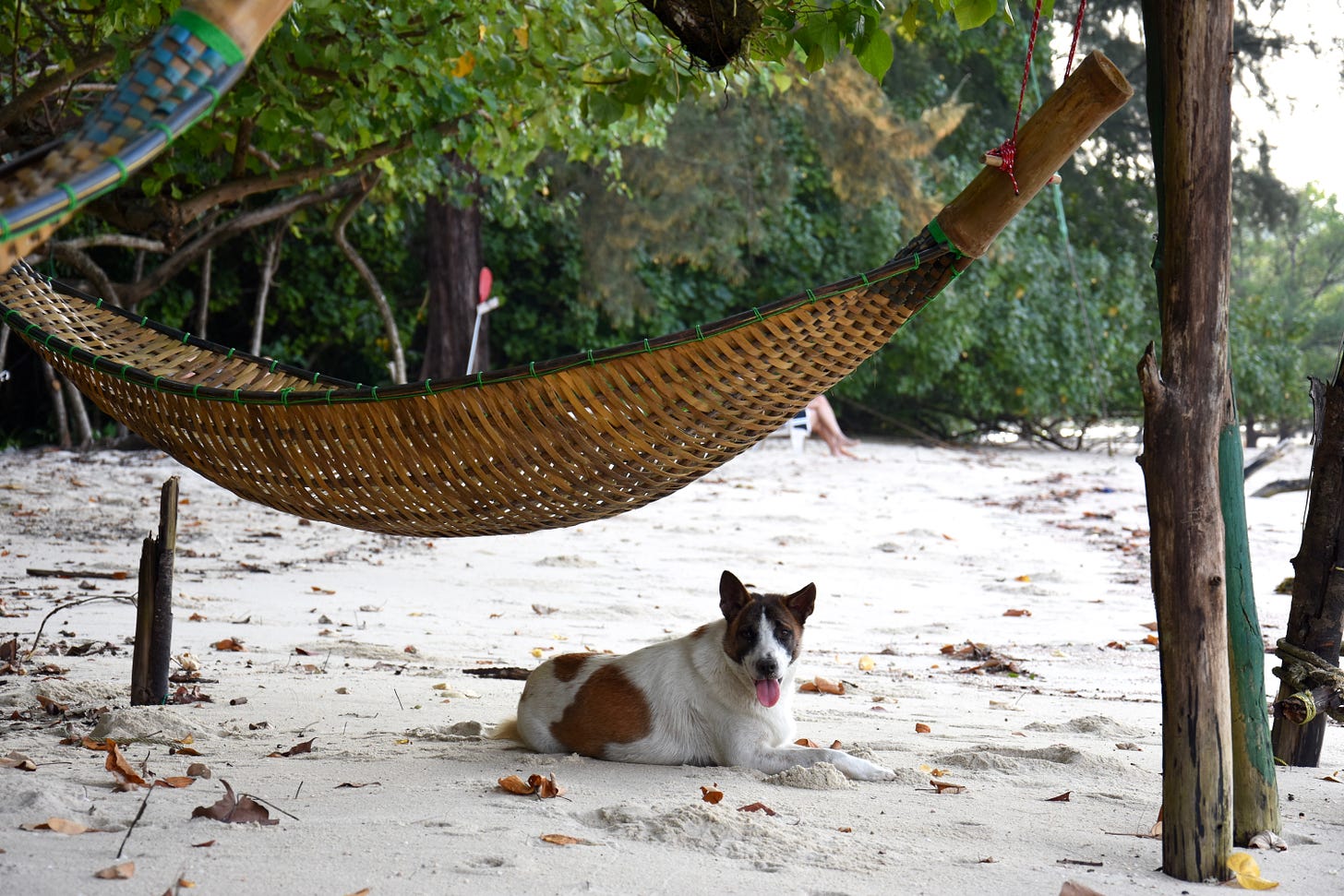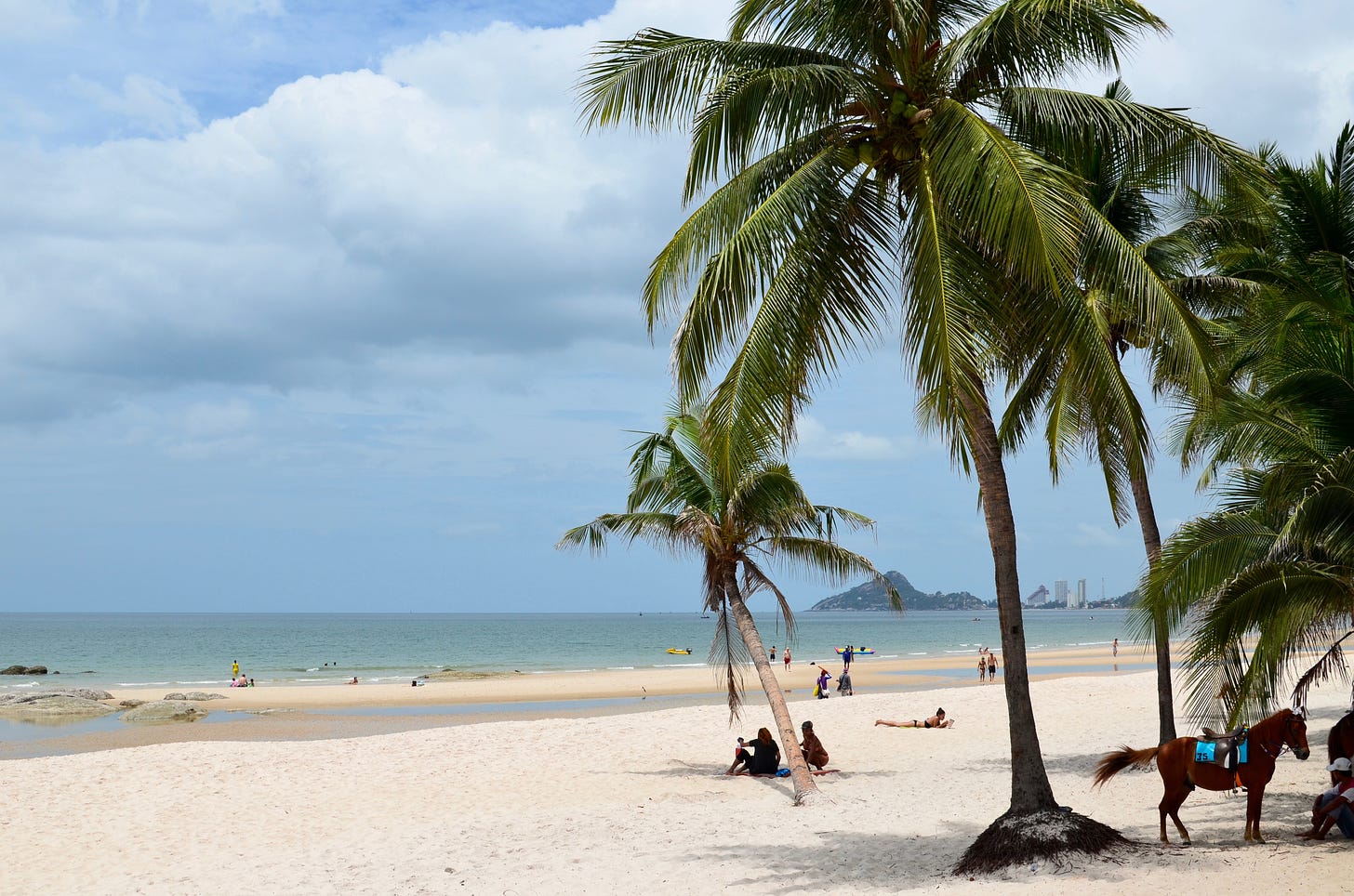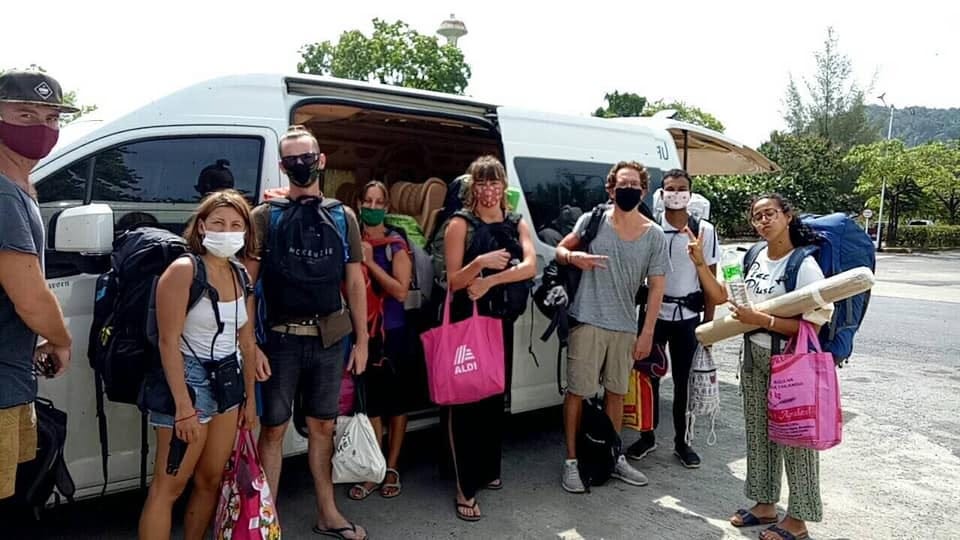Greetings from coastal Thailand, where a busy week included a shark attack along with more island and beach openings. If you’re reading by email, please click over and read this at the online home of Thai Island Times. Why? Because this week’s issue is unusually long thanks to a host of eased restrictions that need some explaining — and some email providers will clip the article before the end.
(If you haven’t yet, please subscribe to get islands in your inbox. For more info on this newsletter, scoot over to the About page.)
This past week I issued an Island Nerd explaining how I make sense of all the Thai islands. A reader commented that it was “very comprehensive,” but stick with me and I promise to take you much, much deeper into the Thai coastal world.
In last week’s Travelfish Weekly, Martin Aristia wrote about what life has been like on Ko Yao Noi during the pandemic. And on Couchfish, Stuart endured a “competitive traveler” on a Laos slow boat before detouring to the “jungle hideout” of Lupa Masa in Malaysian Borneo. That is one place I’d love to go some day.
Cluck cluck cluck. Meet Ko Gai.
Island of the week
I’m in the mood for chicken this week. The name Ko Gai or “Chicken Island” comes from a natural turret of limestone that joins a karst eminence to resemble a chicken looking west towards Ko Phi Phi. Come when the tide is low to stroll on a magnificent sand bar that connects Ko Gai to the neighboring islet of Ko Tub. Both of these and a sprinkling of other isles are part of the uninhabited Ko Poda group, overseen by Mu Ko Phi Phi - Hat Nopparat Thara National Park, and usually visited from Railay or Ao Nang. For more details, see my write up on Travelfish.
Business of the week
If you return to Railay from Ko Gai with chicken on your mind, stroll a few hundred meters beyond Railay West Beach and plop yourself down at Local Restaurant. The family that’s been running this eatery since 2003 dishes out hefty portions of grilled and Southern Thai-style fried chicken with flavorful som tam, as well as terrific gai bai toey (pandan-wrapped chicken) and khao man gai, Chinese-Thai style chicken rice. Don’t fret if you don’t like chicken; they also have vegetarian options and, in my experience, the flavors are not watered down for non-Thai tongues.
Mr. Palinya Chansamout of Ko Sinhai supplements his fishing income by collecting used plastic to sell to Ranong Recycling, a social and environmental enterprise run by Fondation Jan & Oscar. (Source: Fondation Jan & Oscar)
Charity of the week
Named after two children whose lives were tragically lost when the 2004 Asian Tsunami hit the Upper Thai Andaman coast, Swiss-run Fondation Jan & Oscar has spent the past 15 years turning disaster into good. Focusing on marginalized minority groups in Thailand like the Moken and the Lahu, their long list of initiatives includes school construction, vocational training, sanitation projects and scholarship funding. Currently they’re operating a non-profit recycling center in Ranong while providing monthly salaries for six Moken people who work to remove tidal garbage on Ko Surin. Visit their Facebook page for more details.
Website of the week
I’ve been enjoying Phanganist from its modest beginnings as a blog to its modern form as an active online publication devoted to Ko Phangan. It features news and events while keeping a finger on the pulse of the dining, yoga, party and charity scenes that thrive on this enclave of alternative Thai island life. Recent interviews include journalists Joe Cummings, Laure Siegal, and Tom Vater; as well as DJ Nakadia and Kay from Unpacked, a small business promoting sustainable ways of life. I wish every Thai island had a built-in publication like this one.
Otters and turtles
This past Wednesday was World Otter Day and, right on cue, “residents of Ko Phayam spotted at least 10 smooth-coated otters playing on the beach,” reported Khaosod English. Though not unusual around the island, the sea otters have been enjoying a little more peace and quiet than normal over the past few months.
Over on Ko Samui, “a total of 36 baby green turtles hatched from eggs and clambered into the sea,” a research center staffer from Banyan Tree Samui Resort told The Nation. (Here’s a video of some of those adorable hatchlings.) Meanwhile on Phuket, locals freed a young sea turtle after it was found trapped in a fishing net scrap on Yanui Beach. Phuket Andaman News posted a video of the rescue effort.
Good-hearted divers
In the Phi Phi islands, a team of 105 volunteers from 25 countries have removed a whopping 21,529 kg (47,463 lbs.) of garbage over the course of 20 days between late April and this past week, revealed Phi Phi Today. Joining the many volunteers working on land, dozens of resident dive instructors removed heavy debris like tires and nets that had been embedded beneath the sea for years.
On nearby Phuket, the crew from Sea Bees Diving is providing care packages to needy families with help from dive instructors from other operators, including Poseidon Diving, reported the Phuket News. These good-hearted divers are adding to pre-existing charitable efforts organized by another dive outfit, ScubaNicks.
A diver works to remove debris beneath the sea off Ko Phi Phi Don. (Source: Phi Phi Tourism Business Community)
Shark attack in Satun
A 12-year-old boy needed 50 stitches after a run in with a presumed bull shark near the provincial capital of Satun last week. His “left foot was bitten while he was swinging his legs” in the brackish Chebilang River, reported Bangkok Post. The attack prompted the local mayor to offer a bounty of 1,000 baht to anyone who caught the shark, a move that environmentalists quickly derided.
This was the second bull shark attack reported in the Thai Andaman so far this year. The first came in January, when a German tourist was bitten while swimming off a beach in the Khao Lak area. Two attacks in a six-month period is highly unusual in Thailand, where very few shark attacks have been recorded over the past several decades. Thailand’s most recent fatal attack came in 2000, off Ko Phangan.
In other agonizing marine life news, swimmers in the Ao Nang area reported enduring painful jellyfish stings this past week. The stings did not appear to have been inflicted by the lethal box jellyfish, but the bruises looked damn gnarly nonetheless. Do pack a bottle of vinegar to neutralize the damage if going for a swim.
Dengue season bears down
Believe it or not, dengue fever now seems to represent more of a threat to public health in Thailand than Covid-19. An outbreak in the Northeast Thai province of Nakhon Ratchasima infected more than 1,000 people, resulting in two deaths. Recording the highest numbers of dengue fever infections in all of Thailand so far this year, the coastal province of Rayong has also been hit hard.
Infection rates of this painful, mosquito-born illness tend to spike during the rainy season, and outbreaks are already being reported as the annual monsoons set in around much of coastal Thailand. Watch out for those mozzies.
Speaking of rain, storms continued to slap the Thai Andaman coast this past week, causing flash floods on Phuket and parts of the mainland. The body of a foreign man who is believed to have drowned while swimming in rough seas off the Krabi coast was found floating near Ko Poda last Tuesday. His remains were identified late last week, and authorities withheld his name out of respect for the family.
Covid-19 update
Thailand had another promising week on the Covid-19 front. All but one — an asymptomatic woman on Phuket — of the 39 new cases reported this past week came from repatriated Thais who were immediately placed in state-run quarantine upon admission into the country. Sadly there was one more death, a 68-year-old woman in Chumphon province who had pre-existing health conditions.
Phuket closed its Covid-19 field hospital after discharging the last two patients being treated there. The only Thai provinces where locally transmitted infections were discovered in the past 14 days are Bangkok, Nonthaburi, Chonburi, Phuket, and Narathiwat, which are all located on or near the coast. Infections have been minimal, and many Thais are ready for their country to fully reopen.
Entering a month of transition
Last week the government extended the state of emergency until 1st July. Curfew was again shortened by one hour and now runs from 11:00 P.M. to 3:00 A.M.
Police continued to arrest curfew breakers, including a gathering of 30 teens in Chonburi province. Some feel that the curfew is now nothing more than an arbitrary means of control, enabling police and other officials to extort citizens. In a rural Krabi district, officials forced motorists who weren’t wearing masks when stopped at a checkpoint to perform a “cultural dance” as punishment.
Fitness centers, theaters, zoos, tattoo parlors and some massage shops are among the facilities allowed to reopen as part of Thailand’s “third phase” of easing restrictions. Many stores continue to ask shoppers to jot down their phone numbers or scan a QR code to notify their presence through the Thai Chana website. Other sites built to mimic Thai Chana are reportedly stealing data from unsuspecting shoppers.
June will likely be a transitional month leading up to an expected lifting of most remaining containment measures on 1st July. Some authorities still say it’s best to avoid non-essential travel, while others are pushing for unrestricted domestic tourism. As it stands, “permission for inter-provincial trips will remain at the discretion of governors,” said the head of the National Security Council.
Official decrees on travel at the provincial level are being posted on this site, but all of the info is in Thai language only and, as anyone who knows Thailand would expect, the official line often contradicts facts on the ground.
Looks like it will be a little while yet before I can reconnect with friends (and hammocks) on Ko Phayam.
More islands and beaches reopen
Krabi province is unlocking Ko Lanta, Ko Phi Phi and Railay after these popular destinations were closed to non-residents in March.
One daily speedboat between Krabi town and Ko Phi Phi Don is expected to resume this week, with passengers asked to register beforehand. Pre-booked longtail boats have also been cleared to access Railay, and car ferries to Ko Lanta are operating as normal. However, Krabi residents are awaiting clearance to reopen hotels, apart from the few that were allowed to stay open throughout the lockdown.
Krabi is also holding a strict line, along with Trang, Phang Nga, Ranong and Satun provinces, by requiring 14-day quarantine for travelers coming from Bangkok, Phuket and other “high risk” provinces that have reported Covid-19 infections over the previous 14 days. These appear in pink on a map at the Dept. of Disease Control’s website — click on any province to see when its last infection was recorded.
Frustrating many residents, Phuket’s beaches are to remain closed, with another drone video surfacing this past week to show off the island’s eerily empty beaches.
Phuket did reopen 24 piers and its only bridge to the mainland, but the airport is to remain closed until further notice. Additionally, the island province’s governor announced last week that quarantine will be required for anyone entering the island from provinces with Covid-19 infections reported over the past four weeks.
Finishing up in the Thai Andaman, Satun province is still blocking non-residents from visiting Ko Lipe. Hotel owners there reported being required to complete “health and hygiene training” before they can reopen.
Along with Ko Samui, Hua Hin was among the first destinations to welcome tourists back to its beaches.
Over in the Thai Gulf, Ko Lan is reopening to the public after it was sealed off in March. The same goes for Chonburi province’s mainland beaches, including Bang Saen, Pattaya, and Jomtien, which “will be open for all activities,” according to Pattaya News. Again, though, it has not yet been announced when hotels will be allowed to reopen in the Chonburi area. As for Ko Lan, it’s day trips only for now.
On the other side of the Gulf, the governor of Phetchaburi province announced that all beaches, including Cha-am, are reopening. Swimming, however, will not be allowed for reasons that I completely fail to grasp.
A little further south in Hua Hin, which opened for tourism in mid May, visitors can once again rent a horse for a trot out on the beach. Some of the area’s horse owners were hit by a “double whammy” of Covid-19 restrictions and an outbreak of African horse sickness that caused numerous deaths in recent months. Thai PBS World spoke to one owner who “claimed that about 20 of his horses died from the disease.”
Officials in Trat announced that non-residents are now allowed to enter the province. After crossing the border, word is that travelers can now take a ferry to Ko Chang with no subsequent screening upon arrival. While many of the island’s hotel owners have opted to close for rainy season, some are already promoting deals. At nearby Had Lek and throughout Thailand, border crossings remain closed to foreigners.
A meeting of Rayong province officials appears to have resulted in a decision to keep non-resident access to Ko Samet locked up until further notice.
You are now free to dive Chumphon Pinnacle. (Source: The Funky Turtle)
On Ko Tao, which reopened to travelers last week, several scuba operators are running trips to sites like Sail Rock and Chumphon Pinnacle. Daily Lomprayah ferries linking Ko Tao to Chumphon are expected to resume on Thursday as well.
Nearby Ko Samui and Ko Phangan continue to attract travelers at a relatively high clip. All first-hand accounts that I’ve seen indicate that quarantine is not being enforced on travelers visiting these islands, including from Bangkok. Some have reported being required to log body temperature readings online for 14 days.
Other attractions that recently reopened, or are expected to reopen this week, include Damnoen Saduak Floating Market in Ratchaburi; Phra Nakhon Khiri Historical Park in Phetchaburi; Tamarind Night Market in Hua Hin; Nong Nooch Gardens in Chonburi; Khlong Thom Hot Springs in Krabi; and the weekend walking street in Songkhla. Ko Lanta’s Muay Thai Center has also opened for training, although matches with spectators are still banned nationwide.
More public transport resumes
Krabi Airport has reopened, starting with a daily flight from Bangkok with Thai VietJet Air. Other domestic airlines are waiting to resume their Krabi services until the 8th or the 16th of this month, when Nok Air is also planning to resume flights between Ranong and Bangkok.
After all of its flights booked up in advance last month, Bangkok Airways is now operating four daily flights to Ko Samui. Airports in Surat Thani, Nakhon Si Thammarat, Hat Yai and Trang remain open for business as well.
Though public interprovincial bus services have resumed between Bangkok and some parts of Thailand, the state-run bus company abruptly reversed a decision to open routes to Phuket, Trang and Surat Thani last week. As it stands, no public buses have been cleared to operate in Southern Thailand. Buses are however running between Bangkok and Pattaya, as well as Chanthaburi, on the Eastern Gulf.
If you’re wondering what it’s like traveling around the country by train, check out a first-hand account published on Phanganist from a foreign traveler who recently made their way from Phitsanulok in Northern Thailand to Ko Phangan.
PJ Lanta is one of many travel agencies that have been filling in for suspended public bus services in Southern Thailand. Pictured here is a group of backpackers relocating from Krabi province to the ferry pier for Ko Samui and Ko Phangan last week. (Source: PJ Lanta)
Some expats allowed back to Thailand soon
There was some confusion this past week after the head of the National Security Council declared that restrictions on “international and domestic travel” will be lifted on 1st July. It’s true that international commercial flights will (probably) resume on the this date, but there have been no indications that foreigners other than those with work permits or official permission will be allowed into the country.
Those who are permitted to re-enter Thailand will be required to do a 14-day quarantine at a spartan state-run facility, or one of a handful of approved hotels at the traveler’s expense. So far there has been no word on when other expats, for example those with retirement visas, will be allowed back into Thailand.
A promotion for a 15-night hotel quarantine in Bangkok at a total cost of 55,000 baht ($1,736 USD). Add this to the price of a long-haul flight and getting into Thailand would be damn expensive.
Reopening international tourism appears to be a long way off. “I think at the earliest, we may see the return of tourists could be the fourth quarter of this year,” Tourism Authority of Thailand governor Yuthasak Supasorn told CNN Travel. “We have to look at the country of origin (of the travelers) to see if their situation has truly improved,” he went on, hinting that only tourists from countries that have suppressed the coronavirus might be allowed into Thailand at any point this year.
Help on the way?
Several reports published this past week documented the economic tragedy that continues to unfold in Thailand.
Some 4,000 migrant workers on Ko Phangan, most of them from Myanmar, are caught in limbo with no income or aid apart from charitable handouts, reported Laure Siegel and Tom Vater for Nikkei Asian Review. A video by VOA captured the financial strain endured by some residents of Krabi. The Pattaya Mail reported that 1,000 hungry people broke curfew to grab a spot in a rice line as early as 1:00 A.M. And the fledgling state carrier, THAI Airways, cannot honor ticket refunds and could cut as many as 10,000 jobs as part of its restructuring, reported Thai Enquirer.


In response to this catastrophe, the government passed a relief package worth $58 billion USD. Yet some small business owners and workers who were denied previous assistance wonder if any of this money will reach them. The package “allows the money to be used for political gain,” said opposition leader Sompong Amornvivat, adding that “the current fatalities from the Covid-19 and the number of people who committed suicide from economic fallout are now almost the same.”
(Want to help? Here are some fine ways to do so.)
In other news
A group of charities says that slavery and abuse of migrants on Thai fishing boats remains entrenched despite government claims to the contrary, reported Nanchanok Wongsamuth for Reuters.
Pattaya unveiled plans “for a new nine-km monorail to ease congestion,” reported Chaiyot Phupattanapong for Bangkok Post.
Coconuts Bangkok revealed that a group of Thai archaeologists discovered previously unknown 3,000-year-old cave paintings in Khao Sam Roi Yot National Park.
Photographer Joey Santini composed a terrific visual guide to Phuket’s Nai Yang Beach, which will reopen again, some day.
Finally, DNA analysis from a groundbreaking new study on anger in marine animals confirms “that sharks are actually dolphins that are super fucking pissed.” I don’t know about you, but I had my suspicions all along. 🌴




